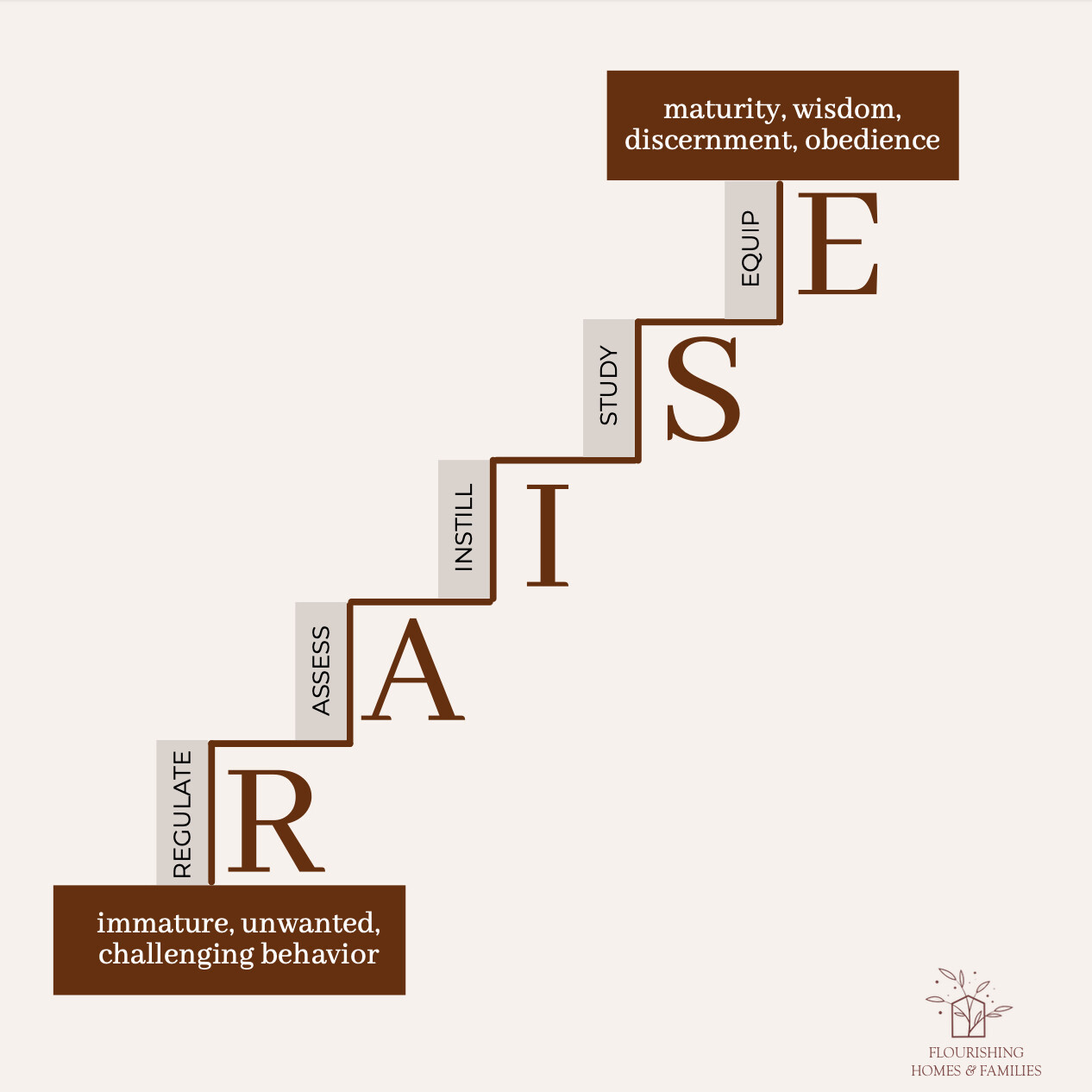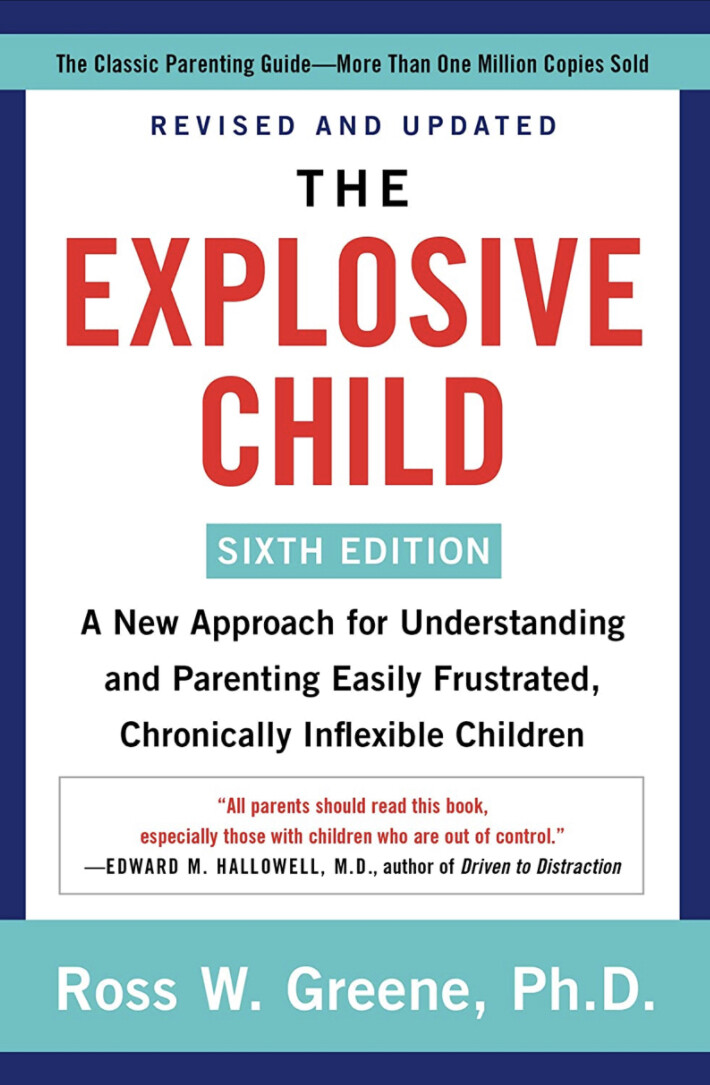When I think back on my experience transitioning into peacemaker parenting I can honestly say that it wasn’t hard at all to choose not to spank or use shame as a form of discipline.
The hard part came next…What on earth am I supposed to do instead?!

As parents, we are instructed to discipline our children and help equip them for life. But what does that look like when the goal is no longer control and compliance?
WHAT DOES DISCIPLINE LOOK LIKE IN PEACEMAKER PARENTING?
The short answer is: it looks like teaching. Teaching children to brush their teeth looks a lot like teaching them to ride a bike. Teaching children how to do conflict and disagreement well looks a lot like teaching them how to do math well. Teaching them how to navigate changing boundaries and limits looks like teaching them about changing seasons and social expectations for those seasons.
It takes time, modeling, practice, practice, practice, and more practice. We expect mistakes! We expect struggle. We expect forgetfulness. Not only from our children but sometimes from ourselves as well, because that's what being human looks like!
IN PEACEMAKER PARENTING, DISCIPLINE IS UNDERSTOOD AS DISCIPLESHIP
One thing you need to know: the majority of your discipline will not take place in the heat of the moment. Yes, there are times when intervention is needed in the moment to keep someone or something safe. But the actual teaching and training of what to do takes place later. Did you catch that? Discipline is about teaching. It's about discipleship, not behavior management. And the goal of discipline is to raise our children towards wisdom, discernment, Spirit-empowered obedience, and maturity.
Let's take a look at how gentle discipline is a means by which we R.A.I.S.E. our children towards maturity.

REGULATE
When the human brain is dysregulated, the learning centers are shut off, or at least slowed down. In Peacemaker Parenting, the goal is for discipline to happen after the child is regulated so that they can learn the lesson or skill that needs learning.
ASSESS
How you respond to your child in the moment largely depends on how urgent or unsafe the behavior is. Assessing for safety and/or injury will inform your response. (You will find that as children grow, the need for this assessment goes down because children become more aware of how their actions impact others.)
INSTILL
You aren't simply teaching a child not to hit their brother. You're instilling family values and kingdom ethics, and you're informing their self-identity and character. Peacemaker Parenting seeks not only to correct a child's misbehavior, it aims to instill core values in age-appropriate ways.
STUDY
Learning about child development will help you know how to guide them toward maturity. Peacemaker Parenting recognizes our expectation of a child's behavior must be reasonable within their developmental abilities. When we expect beyond that which they are capable, we risk exasperating and discouraging them - both of which we are commanded not to do (Colossians 3:21). We also study our child's unique personality, wiring, and temperament so that we provide opportunities to learn and grow in ways that best fit their needs.
EQUIP
The goal of discipline is to teach, train, disciple, and instruct. Children must be taught and equipped with tools and skills to know what to do instead of their impulsive, immature actions. Peacemaker Parenting invests in the child's future success by teaching them the skills and wisdom they are lacking, and allowing the time and space to practice (sometimes quite messily!) until they are confident in those skills.
When it comes to first steps if you’re anything like me, you need a bit of a strategy.
It’s not enough to know what not to do. We need to know what we are going to do when we are running low in both the caffeine and patience departments and a crisis breaks out. Spend some time reading through these ideas and practice what it will look like in your family.
- Use your calm body to help: This one requires a certain level and quite a bit of self-regulation. Sometimes a child might just need a gentle nudge in the right direction. Maybe you have a child refusing to brush their teeth (Been there!). Rather than threatening them with no story at bedtime, it might just take you gently helping them walk into the bathroom. You might even say something as you walk. Something like “you don’t want to brush your teeth right now, but it is my job to help your teeth grow healthy and strong so we are going to brush your teeth. Let me help you.” Your calm influence will help regulate their brains and bodies, which allows them to better follow directions, or collaborate and problem-solve. (A fun collaboration for brushing teeth is to allow your child to brush your teeth and then you brush their teeth!)
- Get to the heart of the issue: Maybe you have an older child who is not doing their chores properly. You know they are capable because they’ve done it well many times, but when you approach the subject with them they are disrespectful and cold. Could it be that they are feeling unmotivated or disappointed because it was a long winter and now it is warm and they would rather be outside? If you don’t ask, you may never know. There could be a simple thought process they just need a little help working through. Ask nonjudgmental questions in an empathetic way. The key is to stay calm and consistently show and tell them that you are always there to help.
- Offer a do-over: This is a beautiful demonstration of grace to our children. Do-overs are a no-pressure way to give a child a second (or third or fourth) chance to do what is expected. Bonus Tip: Turn into a playful robot or fairy to offer the Do-Over, it helps defuse tension! "Malfunction! Malfunction. Reprogramming. Beeep Booop. Do-over sequence initiated."
- Role-Playing: Role-playing allows children to practice tricky situations or challenging behaviors in low-pressure and neutral moments. Give them tools of what you want them to do instead, and then practice with them by playing pretend, practicing scripts, and switching roles.
- Story-Telling: Using stories is one of the most powerful ways to teach children. And we see the greatest disciple-maker, Jesus, using stories to teach important lessons all the time! Story-telling takes a child's particular struggle and redirects it to a relatable character, which allows them to learn without pressure, and even help problem solve.
If you're looking for more tools and strategies, our Peacemaker Parenting Workshop goes over these, and many more other approaches to disciplining our children with peace and gentleness. And our Peacemaker Parenting Scripts E-Book contains more than 70 sample scripts to help you respond to your children with grace and confidence.
 |  |
Have you ever thought that you might be raising a strong-willed child? Here are six signs that you just might be right…

1. Incredibly Inquisitive
Strong-willed kids often learn by asking questions. Lots of them. It is part of who they are! Their brains are naturally inquisitive, and they tend to seek knowledge and understanding, which means they ask "why" about almost everything. Their desire to understand the why behind things is not necessarily rooted in disrespect or a lack of trust in you as the parent, though sometimes it can feel that way. Rather, it is part of who God made them to be!
Action step: This trait is something that should be nurtured and guided to serve them well. Sure, a game of 100 questions is not always appropriate, but if it is a reasonable time to answer, remember to do so with patience and a heart that wants to teach them wisdom and critical thinking skills.
2. Selective Hearing
It might seem like your child is ignoring you or refusing to acknowledge what you are asking them to do. You’re 10 feet away from them and they aren’t answering. What is going on? Young children have a difficult time transitioning their focus from one thing to another. Their brain can quite literally get lost in its own world. Some research indicates it can take a child 60-90 seconds longer to process and respond to auditory stimulation than it does an adult. Add to that a strong sense of determination and independence, and what feels like intentionally ignoring or disobeying is really just an immature brain that is still learning how to transition.
Action step: Remember that this isn’t a game of disrespect, but a display of focus and determination! To help them hear you and transition more smoothly, get down on your child’s level, show an interest in their work, and then communicate your expectations in as few words as possible.
3. Noisily Rejects Help or Suggestions
I think of the child who is trying to complete a puzzle. They have the last piece in their hand. They KNOW it fits here, but they’ve been trying to no avail for a painfully long time to put it in upside down. Mom patiently steps in to guide the piece in a slight rotation and then comes the words “NO! I can do it ALLLLL by myself.” Does this sound familiar? You might have a strong-willed child!
Action step: This child needs help learning 2 things: how to decline help in a graceful way and how to be open to mutual problem-solving. Ask yourself, is there a way you could model this for them? If you are making dinner in the kitchen and your child comes in to help without being asked, then shoves their hands in the mixing bowl, what is your response—Are you responding the same way the child with the missing puzzle piece responded? Or are you making the most of every opportunity to model appropriate and graceful behavior?
4. Intense Emotions
Spirited, spicy, and strong-willed kids feel things very intensely. It could look like an angry outburst because a sibling took a toy, a meltdown because their favorite pink plate is dirty, or a lot of other things. But the common factor is that the way they feel isn’t a secret and it might come on suddenly. Some parenting experts have suggested that strong-willed children live close to shame. Even when parents are intentional not to shame them! These children have a deeper understanding of shame, and it's not quite understood why.
Action step: Your child is freely expressing their feelings to you– But what do you do with those feelings? First, keep your calm. Then, share your calm. There are a lot of different strategies for working through these intense feelings but always ask yourself– “Am I escalating or de-escalating this situation?” Then work toward mutual problem-solving in a way that will help them control and guide their own feelings down the road when they are confronted with the same feelings again. Co-regulating your child will teach them how to regulate their own emotions.
5. Structure-oriented
Sometimes, though not always, kids who are strong-willed can be very schedule-oriented. They thrive on predictability and struggle with the lack of it. Consistent rhythms and routines can be a security to a child who wants to feel in control of their day and they may feel dragged about and helpless if they are just being told to do one thing and then another.
Action step:
Help create structure for the child but also demonstrate the beauty of flexibility. Be looking for opportunities to say “sure! I can be flexible here.” Or “Do you think we could be flexible about this?” Celebrate them when you see them being flexible–it can be hard!
6. Seems to Look for Conflict
Sometimes (okay, many times) it feels like strong-willed children just look for an opportunity to dig their heels in and say no. It can be absolutely maddening! Here is where we can shift again– Oh, what an excellent job they will do solving the world’s problems, standing up for themselves, and defending the weaker ones if we can just teach them well.
Action steps:
Do not enter the struggle. I repeat! Do NOT enter into a power struggle with them. After all, it is not actually a question about who is the leader. You both know who the leader is here. You don't prove you're in charge by controlling your child, you prove you're in charge by controlling yourself! Work toward solving the problem–hint: Your child isn't the problem. Hear them out. Empathize. Look for the “yes.”
I have found that these struggles can be avoided often if parents would stop asking yes or no questions when “no” is not an acceptable answer. Instead of saying “Are you ready to leave for the store now?” you could say “It is time to leave for the store now. Would you like to hold our bags or my hand while we walk down the steps?”
Our strong-willed children are so precious to us! Each one of them has such tremendous potential. We must learn to steward them well and equip them to thrive and flourish as the natural leaders God's created them to be.
Having a spicy, spirited kid is a lot for one set of parents to handle. How well I know that! But it is also a tremendous gift.
If you want more detailed help with peacemaking discipline + helpful explanations of what is actually going on in their little brains, we’ve got you covered! Our upcoming Spirited, Spicy, and Strong-Willed Kids workshop is open for registration!

When it comes to parenting styles we must first take a moment to think about our goals.
I think oftentimes this decision is made based on how an individual was parented. We either think we turned out fine and try to replicate what we remember of our experiences or we feel some level of trauma and we do 100% the opposite. Now both of those instances are from a position of goodwill toward our children, but is it possible that there is more to this decision than that? I would say a very hearty yes.
That is where we must allow ourselves to be vulnerable (maybe even with our own selves) and make some serious choices.
What is important to you as a parent?
I remind myself often that the short period of time my children are here at home under my roof is really only a small part of their lives. My job is to train them to be hard workers, critical thinkers, and steadfast individuals who are unwavering in the truth.
These life skills don’t develop through a parent’s use of fear tactics and punishments to force compliance.
Actually, science tells us that the brain isn’t receptive to developing positive behaviors and habits when fear and punishment are involved.
Fear and stress send the brain into crisis mode and the person becomes like a deer in the headlights just looking for the fastest way out. Compliance is obtained, but it isn't heartfelt obedience or from a place of love and trust. It's a survival instinct. The more effective way to train our children in these skills is from a position of peace.
It is in this place where children are ready and able to learn, create habits, and correct behavior.
The Bible tells us something about this too—this scripture verse has become a motto for me and I refer to it nearly every day…
“And the seed whose fruit is righteousness, is sown in peace by those who make peace.” James 3:18NASB
How cool is that?!
If we want our children to develop into strong individuals, rooted in righteousness, and bursting with fruit, what do we do? We sow the seeds in peace and we become people of peace.
The heart of peacemaker parenting is this…
Christ is our perfect example.
He showed us peace, purchased peace, and gave us a sufficient measure of grace to operate in that peace through the power of the Holy Spirit.
Something else that is neat is the fact that modern neuro-science backs up God’s plan for family peace. How could it not, right?!
If you are new to peacemaker parenting and are ready to learn, then buckle your seatbelt and head over here!
No need to feel overwhelmed here! I’m going to leave you with just a couple simple things to help you as YOUR mind is processing and learning. These are tools that I personally use and find really beneficial to me as a mama doing my best to be a peacemaker.
- Before responding to a crisis, ask yourself “am I in a place of peace?”
Sometimes it takes a pause and a deep breath, sometimes it takes a handful of mini Twix bars. Whatever the case may be, just get in that place of peace before addressing a crisis. This one gets easier as you practice it. And you’re going to find that if you come into a storm with your peace, it helps calm the chaos around you. - Re-evaluate and determine if you are seeking justice or if you are seeking peace.
There is a big difference here! I know this because I’ve been on both sides. Sometimes we just want a punishment to fit the crime, but that isn’t where we peace, is it? When the goal is peace, there is often true repentance and resolution. Instead of looking to bring justice, look for ways to bring peace. - Speak and declare peace over your home. Find God’s promises for peace. Be proactive and pray them over your family. Here are a few of my favorites—> Numbers 6:24-26 | John 14:27 | Isaiah 26:3 | Psalm 34:14 | Hebrews 12:14 | Ephesians 4:3 | 2 Corinthians 13:11
Holidays are a pretty special time of year. They're special for so many reasons, and young children don't always understand those reasons. What they do understand is that things are quite out of the ordinary, and that can cause feelings of anxiousness, excitement, apprehension, and curiosity.

Setting our little ones up for a great holiday experience means that we need to prepare them for what to expect. Here are a few strategies to help prepare little ones for the holidays.
- Let them know the plan and what the day will look like. "Tomorrow is Thanksgiving Day! We're going to wake up and eat a special breakfast, then we're going to go to Gigi and Pop's house. You'll get to play and I bet Pop is going to want to swing you. After lunch, we'll come home for quiet time, and then after supper, we'll go look at Christmas lights!
- Empathize ahead of time. "You're going to see some family members we don't see very often. It's okay if you don't know what to say or if you don't feel like talking to them right away."
- Remember to use visual clues, not time-bound clues throughout the day. "We're going to eat cheesecake and then we're going to pick up toys, say goodbye, and go home."
- Have a plan for common issues. "There might be food you're not used to eating. It will be on your plate, and you can eat what you want. Your body will tell you what you need."
- Invite them to help plan and collaborate. "We're going to have a family Zoom call after lunch! Where do you think we should sit for our call? What toys or books do you want to share with Auntie?"
- Make all plans equal. Have multiple plans for a peaceful, successful day, keep your expectations age-appropriate, be flexible, and know that if your little one winds up not getting a nap, it will still work out.
- Keep perspective. Holidays are wonderful but stressful! Cultivate compassion, empathy, and understanding for your little one, yourself, and your family.
What would you add to the list? How are you prepping your kiddos for the holidays this year?

We get it! Nurturing a strong-willed child requires so much love, peace, patience, kindness, endurance, and self-control. So basically we need the Holy Spirit to show up and bear fruit in our lives as we nurture and guide our strong-willed kiddos!
It helps to remember that with their strong will comes strong needs. Speaking as both a parent of a strong-willed child, and one who was a strong-willed child: one of their needs is for us to view their strength of will not as a fault, a sin, or a problem, but to view their strength of will as a sign of integrity, and recognize that they are people who aren't easily swayed by the opinions and wishes of others.
1. STRONG-WILLED CHILDREN HAVE AN EYE FOR EXCELLENCE AND DESIRE MASTERY (USUALLY LONG BEFORE THEY'RE ABLE TO MASTER SOMETHING!)
Let them take charge of as many of their own activities as possible. Nagging will likely frustrate them, so guide them with questions that allow them to think critically and problem-solve for themselves. Instead of "Put on your shoes!" ask,
"What else do you need to do before we leave?" If they're unsure, remind them of what happens before you leave, and allow them to mentally walk through the steps until they remember they need to put on shoes. When strong-willed kids feel more independent and in charge of themselves, they will have less need to be oppositional.
2. STRONG-WILLED CHILDREN LIKE TO MAKE DECISIONS FOR THEMSELVES.
Have you noticed that your strong-willed child often bristles when you give a directive? If so, try offering choices. This allows them to feel in control, which is often a core need of strong-willed children. You draw a wide boundary, and allow your child to make decisions for themselves within the boundary.
If going to the store is non-negotiable and your child isn't ready to leave the park, try something like: "Do you want to leave now or after you choose one more thing to do? Okay! What's your one more thing to do?"
When it's time to leave, they may still resist, so offer another choice: "Do you want to run to the car or walk like elephants?"
3. STRONG-WILLED CHILDREN NEED TO BE HEARD AND UNDERSTOOD.
Your strong-willed child has a viewpoint that is making them hold fast to their position, and they often are trying to protect something that is important to them. Only by listening calmly and reflecting on their words will you come to understand what's influencing their oppositional behavior. One of the best phrases we've found is "I'm confused, can you help me understand?"
You might use this within the context of your child not wanting to take a bath. "I hear you don't want to take a bath. I'm confused because usually, you feel so clean and snuggly after your bath. Can you help me understand why you don't want a bath tonight?"
The most important thing to remember is...

4. STRONG-WILLED CHILDREN NEED HELP LEARNING FLEXIBILITY
Strong-willed kids are really familiar with boundaries. They know how to draw and stick to boundaries - sometimes relentlessly! They need help learning flexibility and collaboration. Often, parents think they need to hold really firm and sometimes rigid boundaries so their strong-willed kids don't walk all over them. But in reality, they need us to model flexibilty, collaboration, and elasticity. Practically speaking, we as parents can teach them problem-solving skills, how to consider others and their needs, and finding solutions that work not only for them, but for others as well.
5. STRONG-WILLED CHILDREN NEED THEIR "WEAKNESSES" SEEN AS STRENGTHS UNDER CONSTRUCTION
Have you ever heard that our strengths and weaknesses are just two sides of the same coin? The idea is that strengths are the result of guiding weaknesses towards wisdom and maturity. This concept is important for our own growth, and it is especially important in reframing our mindset about our children. One of the biggest mindset shifts in parenting is to learn to see what we tend to view as negative characteristics as positive, and to see their weaknesses as strengths not yet developed. It is easy to see the negatives, isn't it? But what if we chose (over and over again) to see the incredible strengths in the more tricky personality traits?
- Bossy -> Assertive
- Stubborn -> Resolution
- Obsessive -> Conscientious
- Dramatic -> Imaginative
Are you parenting a strong-willed child? Share some of their strengths with us in the comments!
RESOURCES FOR PARENTING A STRONG-WILLED CHILD:

THE EXPLOSIVE CHILD BY DR. ROSS GREENE
Throughout this compassionate, insightful, and practical book, Dr. Greene provides a new conceptual framework for understanding the explosive child's difficulties, based on research in the neurosciences. He explains why traditional parenting and treatment often don’t work with these children, and he describes what to do instead. Instead of relying on rewarding and punishing, Dr. Greene’s Collaborative Problem Solving model promotes working with explosive children to solve the problems that precipitate explosive episodes, and teaching these kids the skills they lack.

SPIRITED, SPICY, AND STRONG-WILLED KIDS
If you've ever wondered if it is possible to parent your strong-willed, sensitive, and spirited kiddo without punishments, yelling, escalating consequences, and harsh reactions, this workshop is for you! We'll do a deep dive on the brain science behind strong-willed and sensitive children, and help you understand why traditional parenting methods seem to wind up in power struggles and frustration.
THURSDAY, FEBRUARY 23, 2023 | 8:00 PM CST | VIA ZOOM








